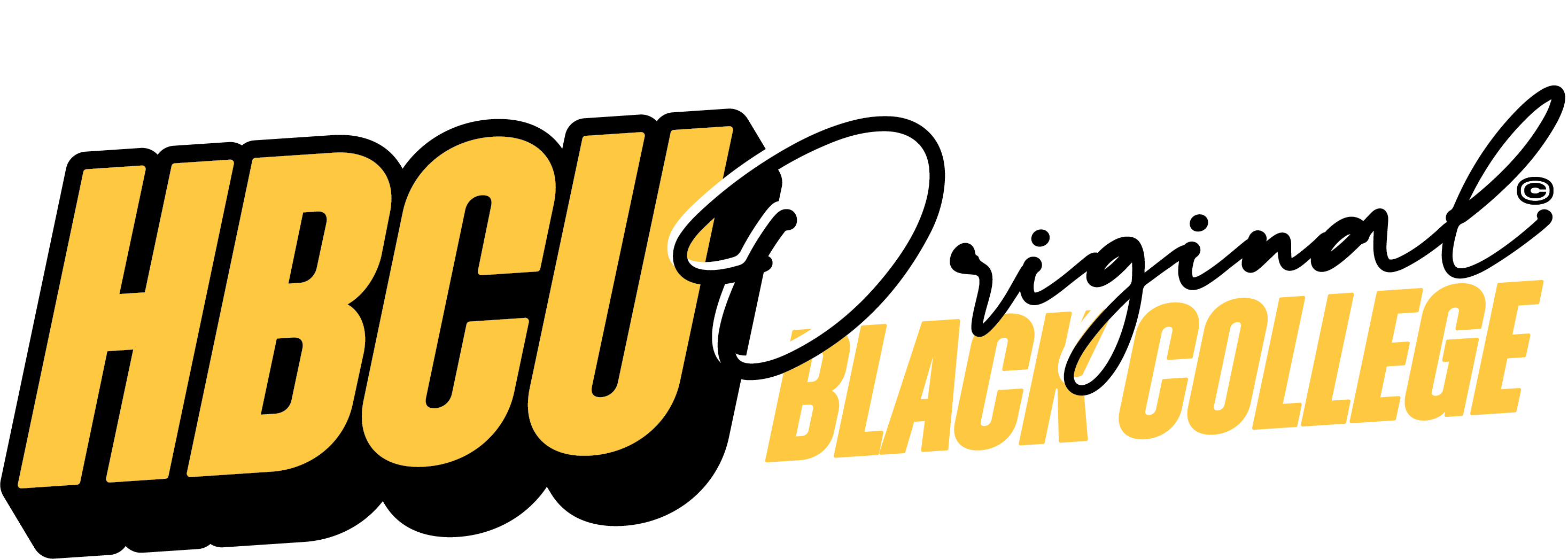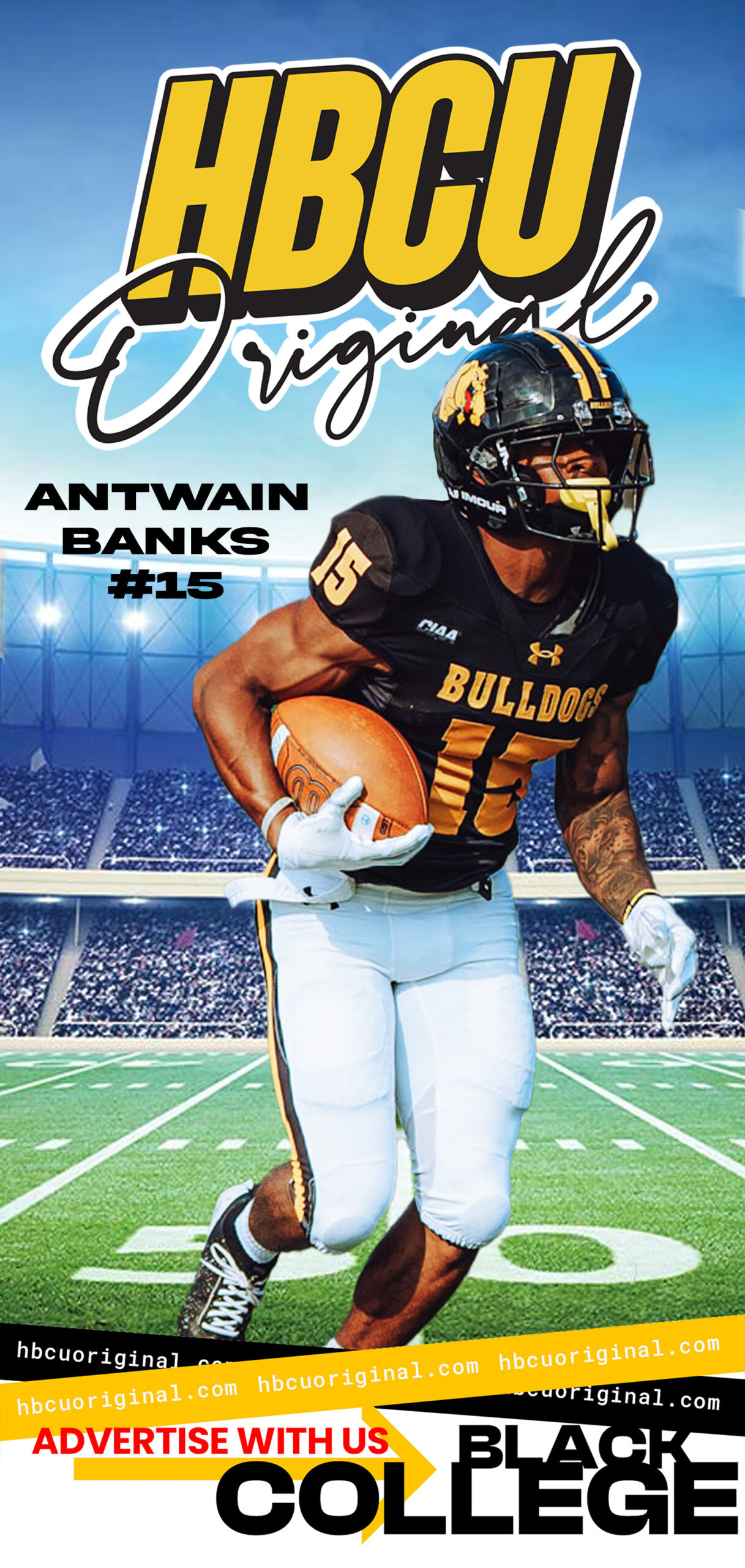HBCU ORIGINAL
Howard University Cuts Ties with Sean “Puffy” Combs Amid Controversy!


In a significant move, Howard University has officially severed its ties with renowned music mogul Sean “Puffy” Combs. This decision follows recent allegations of misconduct against Combs, marking a notable shift in the relationship between the university and one of its most high-profile supporters.
Howard University announced its decision to revoke the honorary Doctor of Humanities degree it awarded to Combs in 2014. This decision was not taken lightly, considering Combs’ long-standing relationship with the university and his substantial contributions to its community. The university also decided to return a $1 million donation made by Combs in 2022, which was intended to support scholarships and various university initiatives.
“The Diddler”
Sean Combs, also known by his stage names Puff Daddy, P. Diddy, and Diddy, has been a significant figure in the music industry for decades. His connection to Howard University dates back to the late 1980s when he attended the university before leaving to pursue a career in music. Despite not completing his degree, Combs maintained a close relationship with Howard, often referring to it as the place where he “found himself” and laying the groundwork for his illustrious career.
The decision to cut ties comes in the wake of serious allegations against Combs. Several women have come forward with accusations of sexual misconduct, which have led to public scrutiny and legal action. Amid these allegations, security camera footage has surfaced showing Combs allegedly punching, kicking, and throwing objects at former artist and girlfriend Cassie. Combs has since issued a public apology, which was not well-received by Cassie’s attorney or fans. These allegations have not only tarnished Combs’ personal reputation but also posed a dilemma for institutions associated with him.
The Howard University’s Statement
In a statement, Howard University emphasized its commitment to creating a safe and respectful environment for its students and staff. The university stated, “Howard University holds its students, faculty, and community to the highest standards of ethical conduct. The allegations against Mr. Combs are serious and, as an institution dedicated to the pursuit of truth and justice, we must take decisive action.”
The statement continued, “We have a responsibility to our community to ensure that our values are upheld. Therefore, we have decided to revoke the honorary degree awarded to Mr. Combs and return his donation. This decision reflects our commitment to maintaining the integrity and safety of our academic environment.”
What the People Think
As expected on Beyoncé’s internet, many people have strong opinions on this topic and how Howard University has handled these claims. While many applaud the university for taking a stand against alleged misconduct, others have expressed disappointment, citing Combs’ contributions and support over the years. This decision underscores the complex nature of navigating allegations of misconduct involving prominent figures. The move by Howard University is likely to influence other institutions and organizations associated with Combs, prompting them to reassess their affiliations and the potential implications of maintaining such relationships.
Moving Forward
As Howard University distances itself from Sean “Puffy” Combs, it reinforces its commitment to ethical standards and the well-being of its community. The university’s decisive action highlights the importance of accountability and the need for institutions to align their values with their actions, even when it involves high-profile supporters.
This development serves as a reminder of the ongoing challenges that institutions face in addressing allegations of misconduct and the necessity of making tough decisions to uphold their principles. Howard University’s decision to cut ties with Sean “Puffy” Combs marks a pivotal moment in its history, reflecting a broader societal shift towards accountability and ethical conduct in the face of serious allegations.
HBCU ORIGINAL
2024 MEAC Cross Country Championships
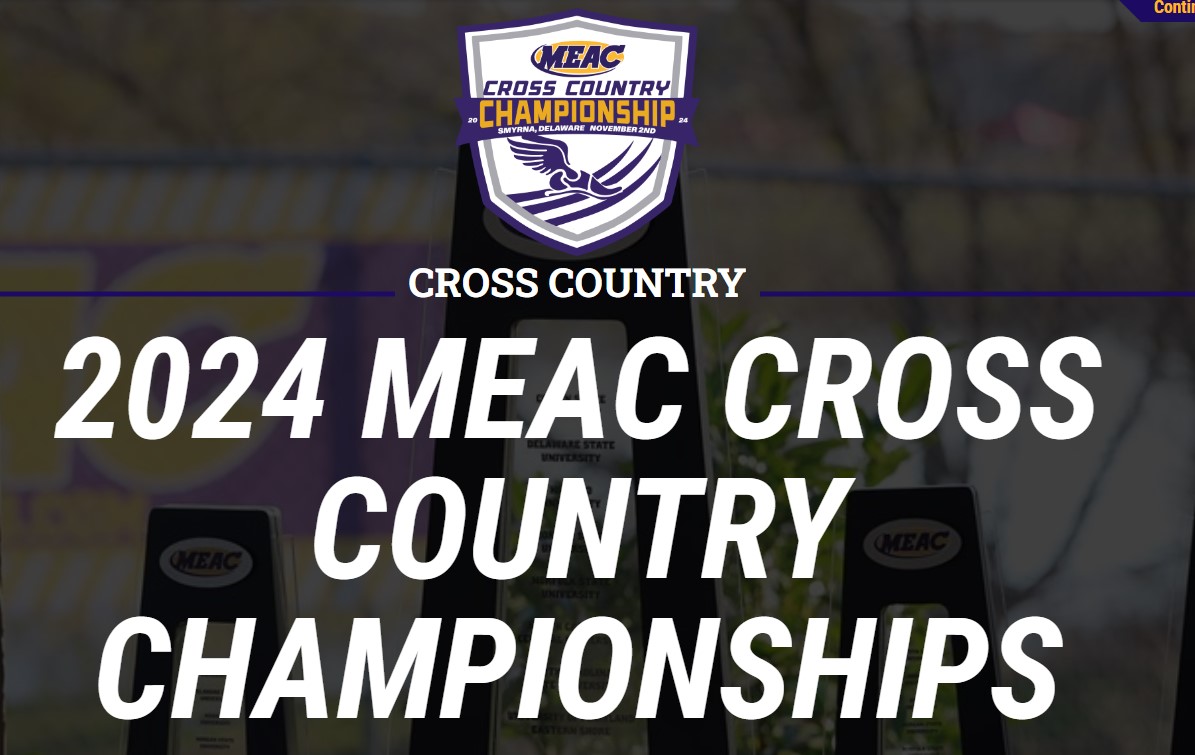
Men’s Race
Men’s Race – 8K – 11:00 AM
- ESPN+
- LIVE RESULTS
- CHAMPIONSHIP MANUAL
- CHAMPIONSHIP SOUVENIR PROGRAM
- TOP-20 TIMES
- WEEKLY HONORS
- MEAC RECORDS
- CHAMPIONSHIP HISTORY
- 2023 MEAC CHAMPIONSHIP RECAP
- MEDIA CREDENTIAL REQUEST FORM

Women’s Race
Women’s Race – 5K – 12:00 PM
- ESPN+
- LIVE RESULTS
- CHAMPIONSHIP MANUAL
- CHAMPIONSHIP SOUVENIR PROGRAM
- TOP-20 TIMES
- WEEKLY HONORS
- MEAC RECORDS
- CHAMPIONSHIP HISTORY
- 2023 MEAC CHAMPIONSHIP RECAP
- MEDIA CREDENTIAL REQUEST FORM
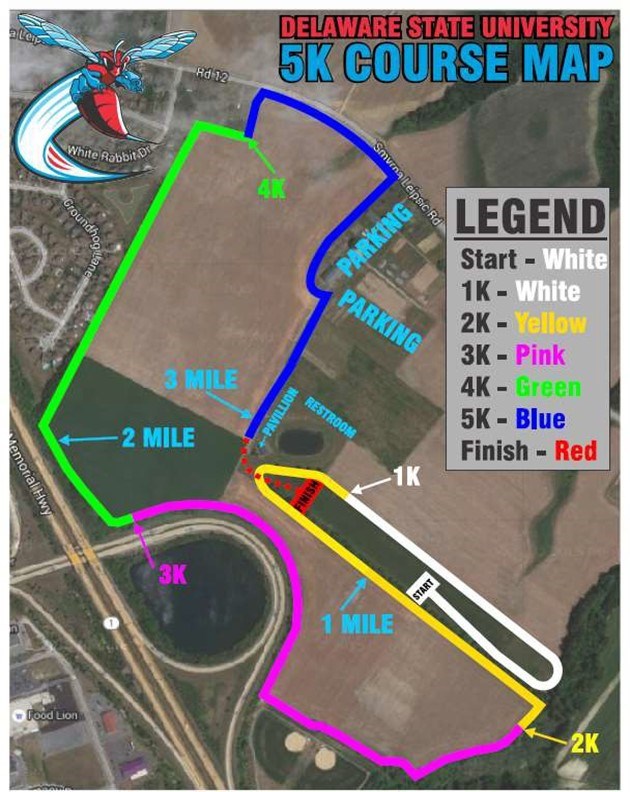
Directions to the DSU Outreach & Research Center – home of the DSU Cross Country Team – from Delaware State University
884 Smyrna-Leipsic Road
Smyrna, DE 19977
- Turn left out of the main entrance of Delaware State University.
- Travel approximately 8 miles north on US Route 13.
- Turn right onto Rt 12/Smyrna Leipsic Rd (opposite direction of the Delaware Hospital for the Chronically Ill).
- Destination will be on your right after you cross Route 1.
Events
North Carolina Central University (NCCU) EAGLES SOAR IN DOMINANT SHUTOUT VICTORY

Oct. 12, 2024 — Durham, N.C.
In a complete showcase of offensive firepower and defensive prowess, North Carolina Central University (NCCU) shut out Virginia-Lynchburg 68-0 on Saturday at O’Kelly-Riddick Stadium, capping off their final non-conference game of the season in emphatic fashion.
NCCU wasted no time getting on the scoreboard, lighting up the first quarter with 33 points. Quarterback Walker Harris opened the floodgates, connecting with Joaquin Davis on a 24-yard touchdown pass. Though the extra point was blocked, the Eagles quickly capitalized again, as Kamari Houze recovered a loose ball in the end zone following a mishandled kickoff by Virginia-Lynchburg. Astonishingly, 13 points were on the board with less than a second ticking off the game clock.
The Eagles’ offense remained relentless. Running back Christian Mosley punched in his third rushing touchdown of the season, extending the lead to 20-0. Wide receiver Mehki Wall followed suit with a 9-yard touchdown reception from Harris, capping a quarter in which NCCU scored on every possession.
By halftime, the Eagles were up 41-0, following scores from J’Mari Taylor and freshman Aleni Mageo, who notched his first career touchdown. The second half saw no letup. Freshman QB Joshua Jones delivered a 15-yard strike to Sterling Greene, before running back Quest Powell closed the scoring with a 1-yard rush, sealing the commanding 68-0 victory.
NCCU’s ground game dominated, amassing 326 rushing yards led by Zion Dobson’s 98-yard performance on 12 carries. Defensively, the Eagles suffocated Virginia-Lynchburg, holding them to -42 rushing yards and allowing just 117 passing yards. The Dragons failed to convert a single third down (0-for-12) and were shut out of the red zone entirely.
With the win, head coach Trei Oliver improved his overall record to 34-20 and extended NCCU’s dominance at home, winning 13 of their last 14 games at O’Kelly-Riddick Stadium.
Notable Stats:
- Walker Harris: 3 passing touchdowns, extending his streak of two or more TDs in four consecutive games.
- J’Mari Taylor: A rushing touchdown in seven straight games, tallying two scores on the day.
- Zion Dobson: Led all rushers with 98 yards and a touchdown.
- Defense: Held Virginia-Lynchburg to -42 yards rushing; Matthew Leavelle led the defense with 6 tackles, 1.5 sacks, and 3.5 tackles for loss.
NCCU heads into their bye week before resuming conference play, riding the momentum of one of their most dominant performances of the season.
For more on NCCU Athletics, visit NCCUEaglePride.com.
HBCU ORIGINAL
Volleyball Previews: North Carolina Central University’s volleyball Travels Shoreside to Delaware State and UMES
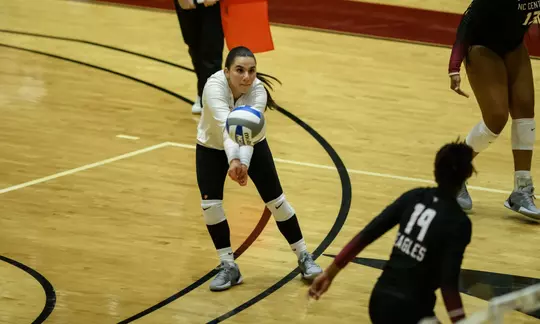
North Carolina Central University’s volleyball team heads back on the road this weekend facing Delaware State University (Friday, Oct. 11 at 6 p.m.) and the University of Maryland Eastern Shore (Sunday, Oct. 13 at 1 p.m.).
COMING UP:
Friday, Oct. 11 – 6 p.m.
NC Central at Delaware State
Memorial Hall Gym, Dover, Del.
Sunday, Oct. 13 – 1 p.m.
NC Central at Maryland Eastern Shore
Hytche Arena, Princess Anne, Md.
Live Stats | Delmarva Sports Network
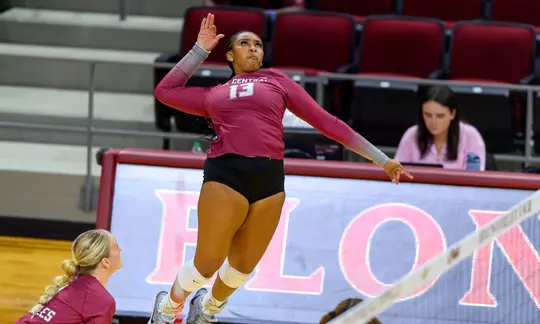
NC CENTRAL COURT
NCCU (3-12 Overall, 1-3 MEAC) looks to bounce back in the next set of games after falling in two MEAC matchups last weekend against Morgan State University, 3-0 and Coppin State University, 3-1.
In the latter of the two matches, junior Kamren Harper extended her double-digit kills streak to five matches in a row leading all attackers with 20 kills versus Coppin State. Junior Emmie Modlin earned a 12-kill, 14-dig double-double in the same match.
The Eagles are in the top 100 nationally in aces per set (92nd – 1.68), team attacks per set (69th – 36.07), team service aces (81st – 99) and team total attacks (92nd – 2,128). NC Central leads the MEAC in digs per set steered by junior Gabriela Felix-Baeza who is third in the MEAC in total digs (189). Senior Bella Dearinger leads the conference in total assists (487).
The DSU Hornets and UMES Hawks each lead the series against NCCU. Delaware State has a 10-4 record when facing the Eagles and Maryland Eastern Shore’s record is 14-4.
NCCU Statistical Leaders – Per Set
KILLS: #13 Kamren Harper (3.02) and #36 Emmie Modlin (2.43)
ACES: #35 Gabriela Felix-Baeza (0.44) and #1 Bella Dearinger (0.31)
ASSISTS: #1 Bella Dearinger (8.25)
DIGS: #35 Gabriela Felix-Baeza (3.20) and #36 Emmie Modlin (2.64)
BLOCKS: #18 Kayden Cupid (0.76) and #10 Tayah Little (0.56)
DELAWARE STATE COURT
Delaware State (6-11 Overall, 2-2 MEAC) split its last two conference matches falling to Howard University, 3-0 on the road and shutting out Norfolk State University in straight sets at home.
DSU’s Gerren Tomlin led the Hornets in kills in both matches with 11 against Howard and 18 over Norfolk State. Paige Ahakuelo and Naz Tuncay were the assist leaders versus the Bison and Spartans.
The Hornets are in the top 50 in the nation in team service aces (25th – 114) and aces per set (50th – 1.81), led by Tomlin who leads the conference individually and is ranked 17th nationally in aces per set.
DSU is second in the MEAC in multiple categories including aces per set, team assists, team kills, team service aces and team total attacks. Tomlin is also ranked 11th nationally and first in the conference in service aces (34).
DSU Statistical Leaders – Per Set
KILLS: #1 Gerren Tomlin (2.85) and #12 Aaliyah Mitchell (2.17)
ACES: #1 Gerren Tomlin (0.54)
ASSISTS: #9 Paige Ahakuelo (5.21) and #17 Naz Tuncay (4.46)
DIGS: #1 Gerren Tomlin (2.48) and Valeria Otero (2.38)
BLOCKS: #30 Hannah Sanders (0.60) and #20 Martyna Kmuk (0.54)
MARYLAND EASTERN SHORE COURT
Maryland Eastern Shore (6-9 Overall, 1-3 MEAC) was shutout in their last two contests on Oct. 4 to Norfolk State and Oct. 6 to Howard.
UMES’ Ranyla Griggs had 12 kills at NSU. Anisa Dorlouis and Isil Yilmaz led the Hawks in assists and digs through both matches. The Hawks are third in the MEAC in blocks per set (1.98) and team total blocks (103) and second in opponent hitting percentage (0.191).
Dorlouis is 12th in the nation in triple-doubles after securing an 11-kill, 29-assist, 14-dig performance versus Iona University earlier in the season. Valeria Matias is fourth in the MEAC in total digs (188) and Griggs is fifth in the conference in kills per set (2.90).
UMES Statistical Leaders – Per Set
KILLS: #23 Ranyla Griggs (2.96) and #12 Nkemjika Ikemefuna (2.73)
ACES: #6 Anisa Dorlouis (0.27) and #9 Anjola Omolewa (0.22)
ASSISTS: #6 Anisa Dorlouis (6.00) and #19 Tola Maczka (3.27)
DIGS: #1 Valeria Matias (3.84) and #6 Anisa Dorlouis (3.13)
BLOCKS: #18 Lilliana Montes (0.81) and #9 Anjola Omolewa (0.76)
For more information on NCCU Athletics, visit NCCUEaglePride.com, or download the NCCU Eagles Athletics app.
HBCU ORIGINAL
SUNO Men’s Basketball Hosts Media Day
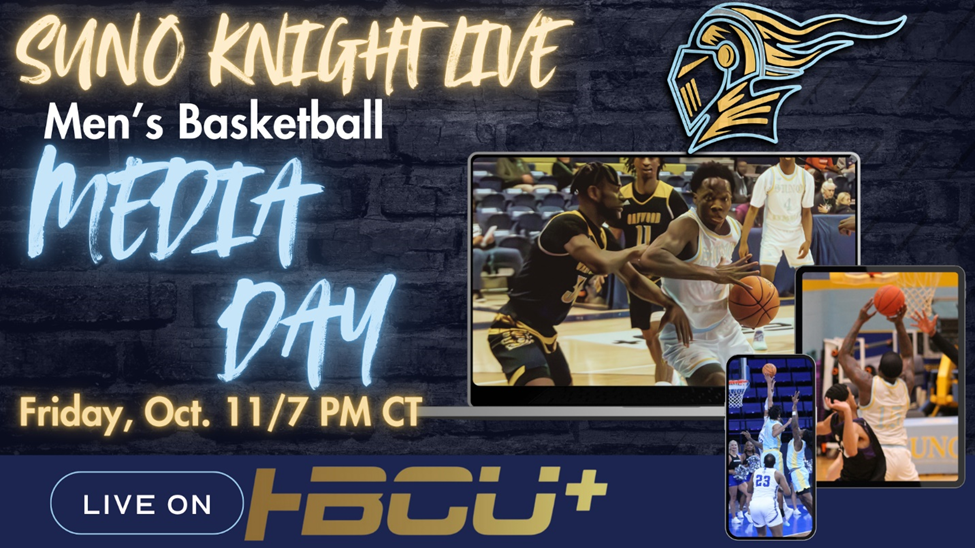
HBCU ORIGINAL
Trimble Opens Technology Lab at Florida A&M University, Marking New HBCU Collaboration

TALLAHASSEE, Fla. and WESTMINSTER, Colo., Oct. 3, 2024 /PRNewswire/ — Florida A&M University (FAMU) and Trimble (Nasdaq: TRMB) celebrated the grand opening of the new Trimble Technology Lab at the Tallahassee campus on October 2.
This event marks a major milestone as FAMU becomes the first Historically Black College and University (HBCU) to host a Trimble Technology Lab (TTL). The lab at FAMU is set to revolutionize the learning experience for students in architecture and construction engineering by providing access to state-of-the-art technology and software solutions.
“Trimble’s generous support will equip our students and faculty with state-of-the-art technology, while setting a historic precedent,” said Andrew Chin, Assoc. AIA, dean, FAMU’s School of Architecture & Engineering Technology. “We are honored by a gift that demonstrates a commitment to cultivating a diverse and technologically proficient generation of architects and engineers.”
In addition to the donation of software and hardware technologies from Trimble, the Trimble Foundation Fund —Trimble’s philanthropic donor-advised fund — provided a grant to support the renovation and refurbishment of classroom spaces to house the new labs. FAMU is the first institution to be a recipient of a grant from Trimble Foundation Fund in connection with the establishment of a Trimble Technology Lab.
“Establishing our first technology lab at an HBCU underscores our commitment to fostering a more diverse and inclusive construction workforce,” said Amy Northcutt, director of education and outreach at Trimble. “By partnering with Florida A&M University and providing a grant from the Trimble Foundation to support facility renovations, we aim to create a more equitable environment in the industry. This initiative ensures that FAMU students have access to cutting-edge resources and tools, enhancing their education and preparing them for successful careers in construction.”
“The facilities grant from the Trimble Foundation offers a distinctive opportunity for FAMU students to access cutting-edge technology in the construction industry, enhancing their competitiveness in this rapidly evolving field,” said Doreen Kobelo, Ph.D., director of the division of engineering technology at FAMU. “Given the limited funding for capacity building, this grant allows for significant student advancement through solutions that would otherwise be inaccessible with state funding. This initiative will increase the number of underrepresented minorities equipped with expertise in advanced construction design and management solutions.”
The lab includes a broad range of Trimble’s industry-leading geospatial and construction solutions such as the Trimble® Ri robotic total station and XR10 HoloLens hardhat as well as advanced software solutions including RealWorks® scanning software, Trimble Business Center Infrastructure Construction edition, Tekla® Structures, Tekla Structural Designer, Trimble Connect® AR interactive collaboration software, and the company’s popular 3D modeling solution, SketchUp®.
About Florida A&M University
Founded on October 3, 1887 with its main campus in Tallahassee, Florida A&M University (FAMU) is the only public, historically Black university in Florida. What distinguishes FAMU from other universities is its legacy of providing access to a high-quality, affordable education with programs and services that guide students toward successfully achieving their dreams. FAMU is part of the State University System of Florida and is accredited by the Southern Association of Colleges and Schools Commission on Colleges.
In addition to its main Tallahassee campus, FAMU has several satellite campuses across Florida. These include the College of Law in Orlando and the College of Pharmacy and Pharmaceutical Sciences, Institute of Public Health, which has sites in Crestview, Tampa, Jacksonville and Miami.
About Trimble Foundation Fund
Trimble Foundation Fund is a donor-advised fund that focuses its charitable giving on the missions of supporting natural disaster and climate resilience, promoting female education and empowerment and advancing diversity, equity and inclusion. The Trimble Foundation Fund is aligned to the company’s commitment towards building a more sustainable future. For more information on the Trimble Foundation Fund, visit: foundation.trimble.com.
About Trimble
Trimble is transforming the ways people move, build and live. Core technologies in positioning, modeling and data analytics connect the digital and physical worlds to improve our customers’ productivity, quality, safety, transparency and sustainability. For more information about Trimble (Nasdaq: TRMB), visit: www.trimble.com.
-
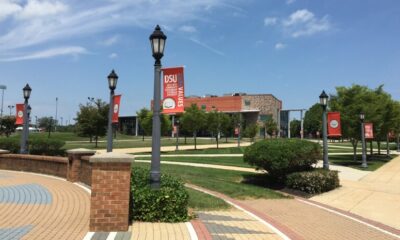
 Campus8 months ago
Campus8 months agoDiscovering Heritage and Excellence: A Journey through Delaware State University’s Iconic Campus
-

 Campus8 months ago
Campus8 months agoEmbracing Tradition and Innovation: A Tour of Lincoln University’s Historic Campus
-

 Campus8 months ago
Campus8 months agoA Journey through Morgan State University’s Storied Campus
-

 HBCU ORIGINAL7 months ago
HBCU ORIGINAL7 months agoExploring Excellence: A Journey Through Bowie State University’s Historic Campus
-

 Campus8 months ago
Campus8 months agoA Day in the Life: Exploring Campus Culture at HBCUs
-

 Campus7 months ago
Campus7 months agoCoppin State University’s Historic Campus
-

 Events7 months ago
Events7 months agoBiden campaign working to turn its HBCU support into electoral support
-

 Alumni Impact7 months ago
Alumni Impact7 months agoNotable Alumni from Historical Black Colleges and Universities (HBCUs)
